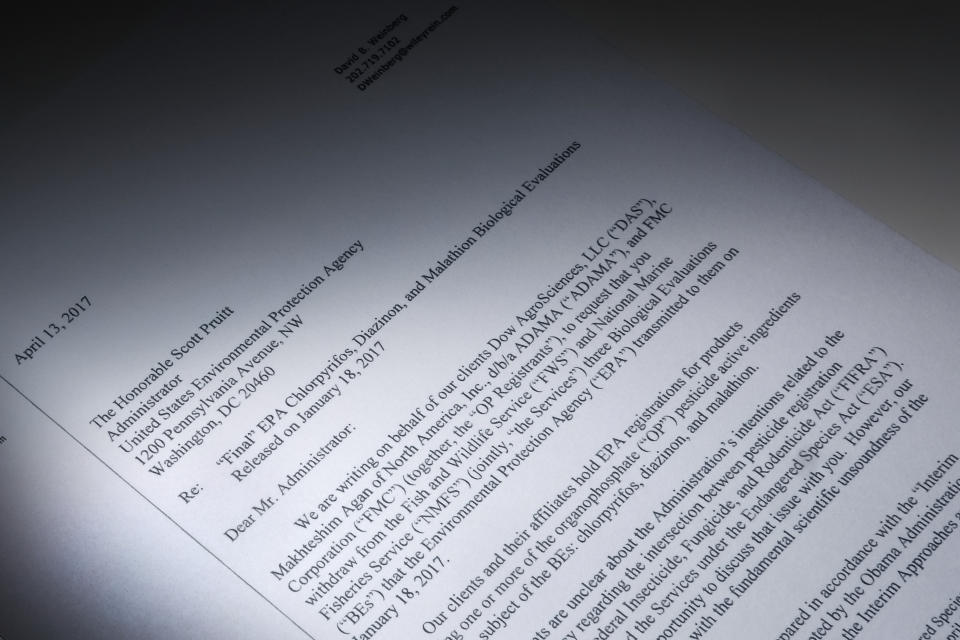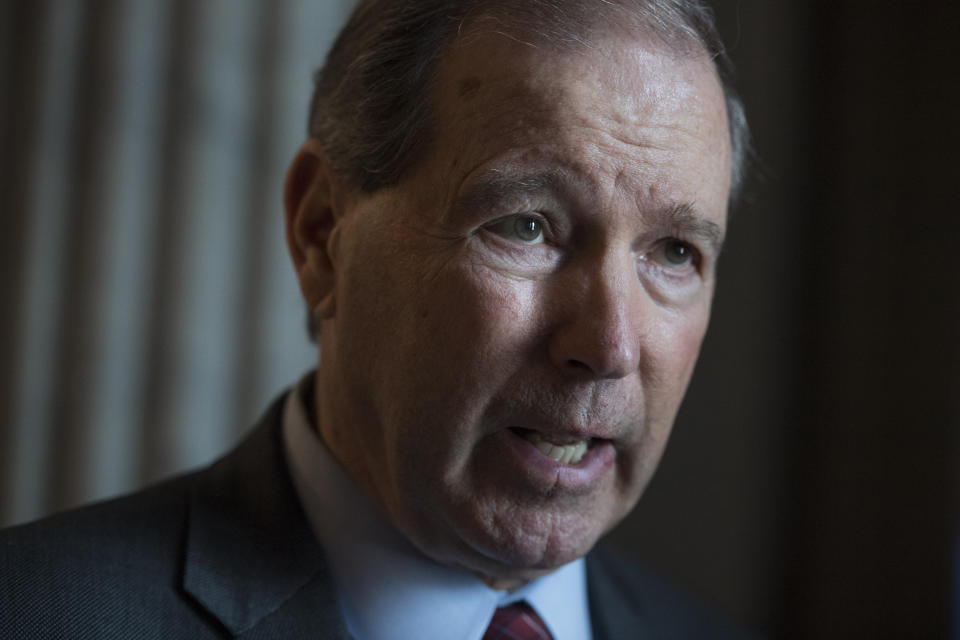Sen. Tom Udall wants EPA to ban neurotoxic chemical: 'Scott Pruitt doesn't listen to science'
In defiance of President Trump’s deregulatory agenda, Sen. Tom Udall, D-N.M., is fighting to ban a pesticide that’s been found to cause brain damage and other neurological harm to children.
Udall introduced a bill last summer, the Protect Children, Farmers and Farmworkers from Nerve Agent Pesticides Act, to prohibit chlorpyrifos (pronounced klawr-pir-uh-fos), which is commonly used on popular vegetables, nuts and fruits, including apples and oranges.
In March 2017, EPA Administrator Scott Pruitt rejected the conclusion of EPA scientists that all uses of chlorpyrifos put children and farmworkers at risk. Pruitt claimed that the science isn’t settled and struck down an EPA rule proposed two years earlier to outlaw use of the chemical.

“In one of his first decisions at the EPA, Administrator Pruitt showed his hand. He showed the American people exactly how he’d use his position at the EPA: to grease the wheels for his friends in industry at the expense of the health and safety of children, families and workers,” Udall told Yahoo News.
Over the past decade, the science has built up to show that even low levels of exposure to chlorpyrifos during critical times in a brain’s development, whether in utero or during childhood, can lead to long-lasting, potentially permanent changes. A landmark brain-imaging study from the Columbia Center for Children’s Environmental Health at the Mailman School of Public Health in 2012 identified cognitive damage in humans, corroborating previous findings in animals, after prenatal exposure to chlorpyrifos at levels below the EPA’s toxicity threshold.
“Scott Pruitt doesn’t listen to science,” Udall said.

Since he introduced the bill, Udall said there’s been evidence that members from both sides of the aisle realize that protecting children from toxic chemicals is not a partisan issue. He noted that a bipartisan coalition came together to end Michael Dourson’s nomination to run the EPA’s toxics office. He called Dourson “a toxicologist for hire who produced junk science for industry.”
“And there are other signs of progress: Hawaii just became the first state in the country to officially ban chlorpyrifos,” Udall continued. “I’m optimistic that other states will pursue a ban as well, as long as the EPA administrator refuses to uphold the fundamental mission of his office to protect American families.”
A brief history of how we got to this point: The EPA banned chlorpyrifos, the most used pesticide in the U.S., from household products in 2000, but affirmed it would still be permissible for agriculture and industry. In September 2007, the Natural Resources Defense Council (NRDC) and the Pesticide Action Network of North America filed a petition for the EPA to either ban the toxic chemical outright or establish residue standards for our food supply. In September 2015, the U.S. Court of Appeals for the Ninth Circuit ordered the EPA to respond to the petition and — following an extensive review — the EPA ordered that the chemical be banned from the food supply completely.
Miriam Rotkin-Ellman, the senior scientist for the health and environment program at the Natural Resources Defense Council (NRDC), said she and her colleagues have long been concerned about chlorpyrifos and related pesticides, which are known as organophosphates, because they’ve followed the science since it was allowed in homes to kill roaches and ants.
“The federal EPA had reanalyzed the safety of this pesticide and found the food uses were not safe and were putting in motion the process to get it out of the food supply. The administration changed and Pruitt reversed that process, and now we’re scrambling to fight to fulfill what should have been done already,” Rotkin-Ellman told Yahoo News.
Andrew Liveris, the CEO and president of Dow Chemical, the multinational chemical corporation that’s manufactured chlorpyrifos for over 50 years, was appointed to lead Trump’s now-defunct American Manufacturing Council in December 2016. The corporation subsequently donated $1 million to his inauguration fund. Pruitt was scheduled to have a half-hour meeting with Liveris at a Houston hotel during an energy conference on March 9 — just weeks before he reversed the EPA’s chlorpyrifos ban. An agency spokesperson told the AP that the meeting “never happened due to schedule conflicts” but that the two men had a “brief introduction in passing.”

In April 2017, the Associated Press reported that lawyers from Dow and other manufacturers of organophosphates sent letters to the heads of three of Trump’s Cabinet agencies, urging them to “set aside” the government studies that determined the toxic chemical to be dangerous. According to the report, federal scientists compiled more than 10,000 pages showing that chlorpyrifos and two other pesticides — diazinon and malathion — pose a risk to nearly every endangered species it studied.
In response, Dow released a statement denouncing the AP article for what it called “misleading and inaccurate statements” and said more than 4,000 studies support chlorpyrifos’ as safe for health, safety and the environment.
“In its preparation of biological evaluations of chlorpyrifos and the other compounds under the Endangered Species Act, EPA did not apply its own standards of data quality, nor did it follow its own procedures. As a result, Dow and other companies submitted concerns and scientific requests through various proper channels,” the statement reads.
Dow stood by chlorpyrifos and argued that a “comprehensive regulatory review of all available data” would continue to support its safety. The company pointed out that the chemical has been approved for use in nearly 100 countries.
“We are advocating that EPA return to applying its own standards of data quality and following its own procedures. Dow will continue to actively participate in policymaking and political processes in compliance with all applicable federal and state laws,” Dow said.
Udall said it’s hard to know exactly how Dow Chemical influenced the EPA’s surprise decision to reverse its own proposed ban, but that Pruitt’s scheduled meeting with the company’s CEO days before overruling his own agency’s scientists is extremely troubling.

“It certainly appears that the administrator was putting the interests of corporate chemical manufacturers ahead of the health and safety of American families when he made this disastrous decision,” Udall said.
In May, 2017, the Trump administration named Nancy B. Beck deputy assistant administrator at EPA’s toxic chemical unit, the Office of Chemical Safety and Pollution Prevention, which is responsible for protecting “you, your family and the environment from potential risks from pesticides and toxic chemicals.” She had spent the previous five years as an executive at the American Chemistry Council, a chemical industry trade group whose members include Dow, ExxonMobil Chemical, Monsanto, DuPont and KMG Chemicals.
The New York Times and others have reported that Beck’s arrival brought immediate demands for rules regarding the regulation of hazardous chemicals to be rewritten so it would be harder to track their impact on public health or to regulate them. Beck shares the chemical industry’s view that “phantom risks” lead to oppressive regulations. Beck ordered EPA scientists to revisit rules for methylene chloride (found in paint strippers), trichloroethylene (which is used in dry cleaning and to remove grease from metal) and perfluorooctanoic acid (which is used in fabric protectors and as a nonstick coating for cooking pans), in addition to chlorpyrifos. Each has been linked in studies to serious health issues.
On May 10, the EPA announced it would take action on methylene chloride “shortly.” NRDC health program director Erik Olson responded in a statement that Pruitt should “immediately act to save others’ lives by finalizing the agency’s proposed bans of methylene chloride and two other highly toxic solvents.”
Udall’s bill is co-sponsored by Sens. Richard Blumenthal, D-Conn., Cory Booker, D-N.J., Ben Cardin, D-Md., Richard Durbin, D-Ill., Kirsten Gillibrand, D-N.Y., Kamala Harris, D-Calif, Ed Markey, D-Mass., and Jeff Merkley, D-Ore.
“I’ll keep fighting to raise awareness of our effort to ban chlorpyrifos and encourage my colleagues to co-sponsor our bill to protect the health of our children, farmers and farmworkers from this toxic pesticide,” Udall said.

But federal legislation isn’t the only avenue for public health advocates on this issue. Udall encouraged citizens to raise their voices to the EPA, their representatives and their food providers.
“During the Trump administration we’ve seen time and again, on divisive issues from health care to gun control, that a group of concerned, organized Americans can succeed in holding not only Washington but corporate America accountable,” he said.
Udall recently sent a letter to more than 80 grocery stores, food service providers and national restaurant chains asking whether they source their fruits and vegetables from suppliers that utilize chlorpyrifos.
“I’m confident that if consumers make it clear that they have no interest in consuming foods treated with chlorpyrifos, large food buyers will listen and change their on-farm policies and practices,” he said.
States have independent authority to ban pesticides, and some are considering their own bans. California is conducting an exhaustive review of chlorpyrifos. Rotkin-Ellman said California is the biggest chlorpyrifos user and among its biggest producers, so a ban there would make a big difference.
“The folks working on that are expecting to get some real answers from the state this summer. Timing is converging here,” she said.
Udall and other Democratic senators have placed a hold on H.R. 1029, the Pesticide Registration Improvement Extension Act of 2017, in an effort to stop the EPA from moving forward with its plans to roll back these Obama-era rules.
“I want the EPA to comply with the law with respect to its dangerous decision not to go through with a ban of chlorpyrifos,” he said. “I will remove my hold on PRIA if EPA works with me to protect these common-sense and highly popular protections for kids and farmworkers.”
Read more from Yahoo News:



